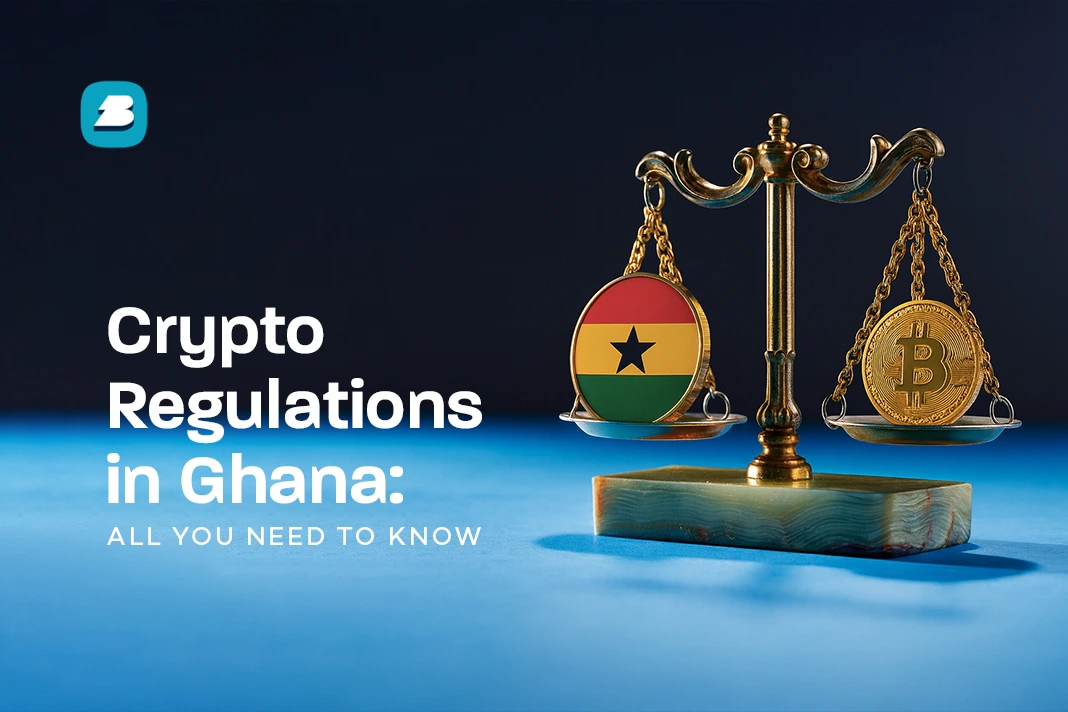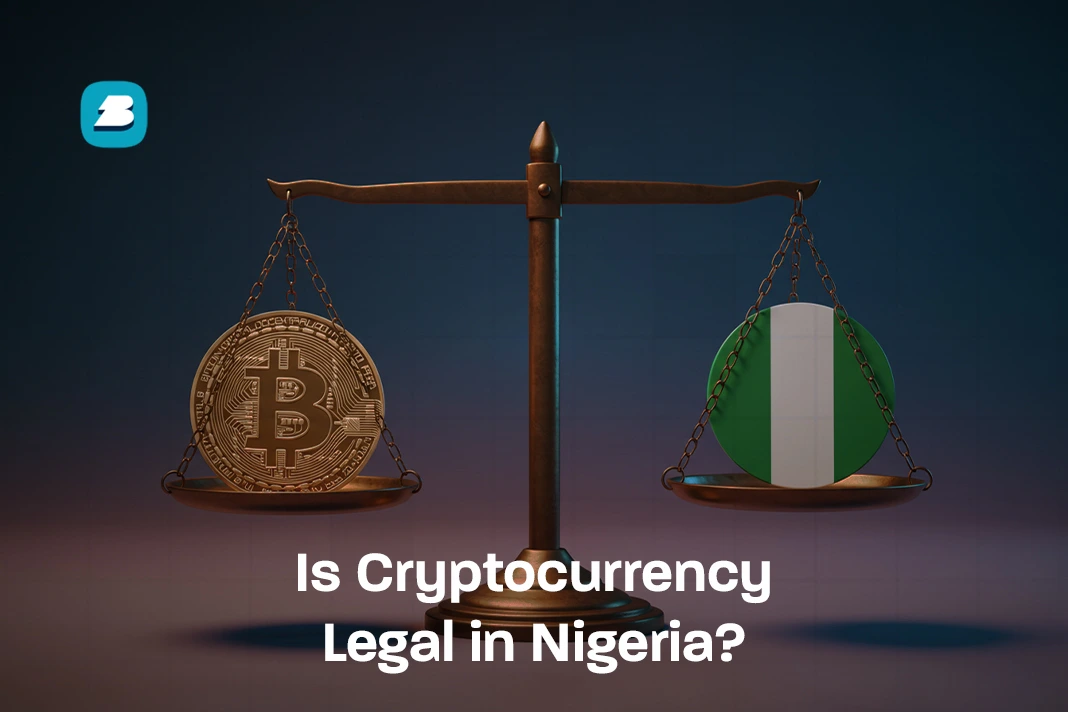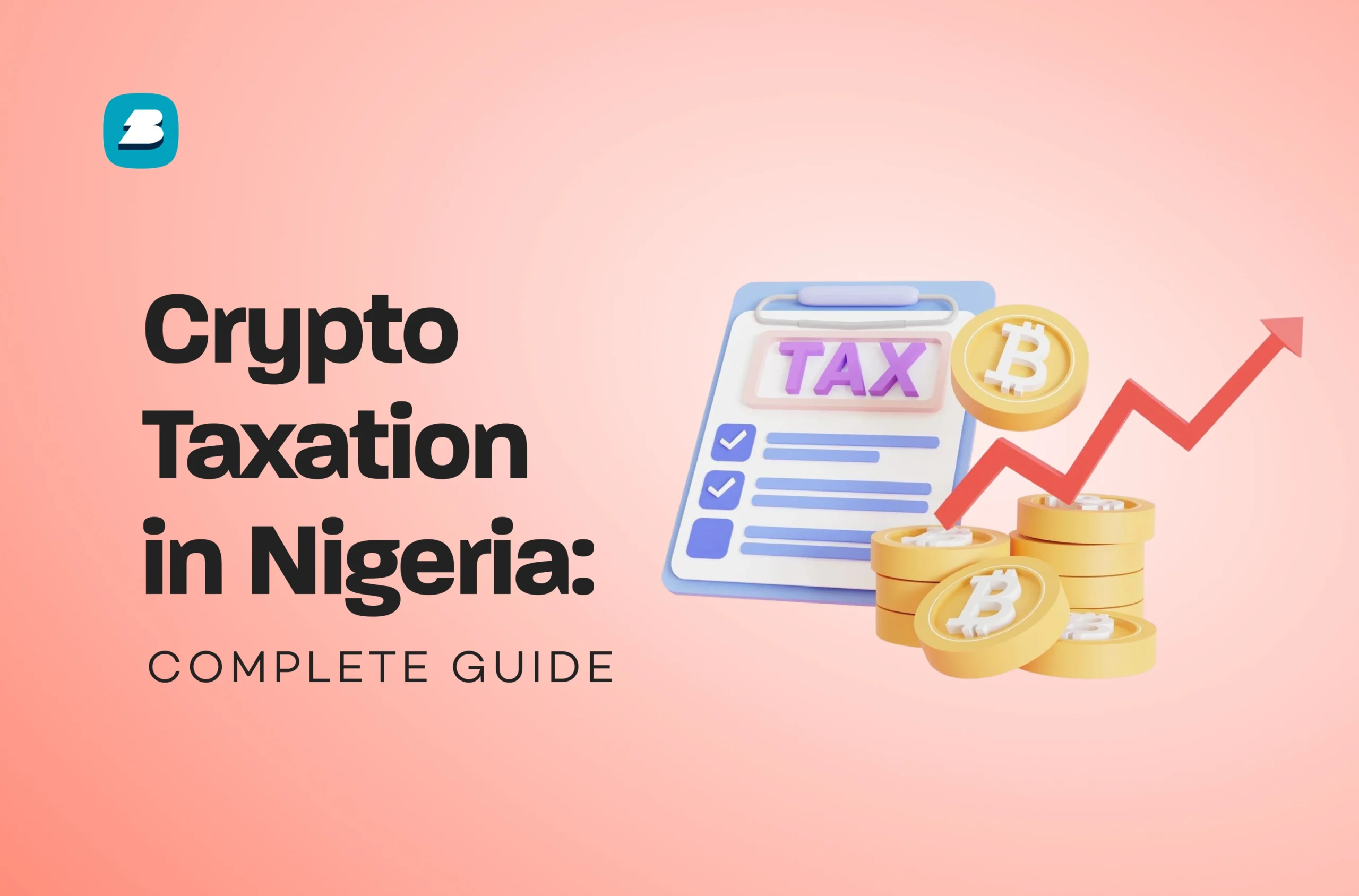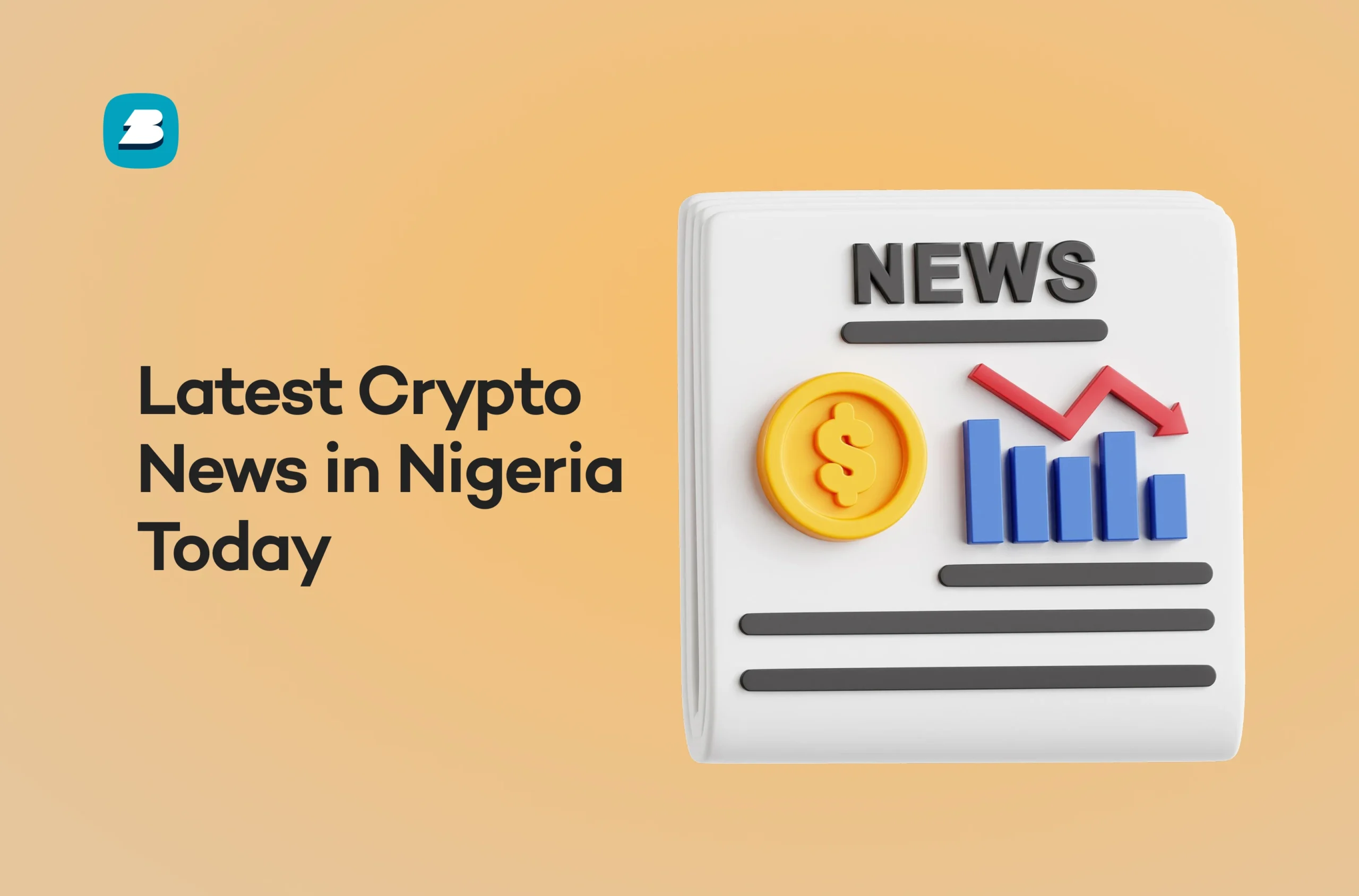Did you know that Ghana is one of the fastest growing cryptocurrency markets in Africa, with over 3 million active crypto users as of 2025?
From Bitcoin to Ethereum, and stablecoins, digital assets have become part of how Ghanaians save, trade, and transact across borders. Yet, despite this growth rate, the country’s regulations on crypto have long been uncertain.
The Bank of Ghana (BoG) has repeatedly clarified that cryptocurrencies are not legal tender, but they are not illegal either.
This “gray area” has left many traders, businesses, and exchanges operating without clear rules backing cryptocurrency in Ghana, until recently.
In 2025, the Bank of Ghana took major steps toward building a comprehensive crypto regulatory framework. With the creation of the Virtual Assets Regulatory Office (VARO) and new laws targeting Virtual Asset Service Providers (VASPSs), the law is set to change.
In this guide, we’ll break down the current legal status of crypto in Ghana, the latest updates to regulations, and what these changes mean for users, businesses, and exchanges.
Where Ghana Stands Today: Legal Status of Crypto
Cryptocurrencies in Ghana exist in a legal gray area, which means, they are neither banned nor fully regulated.
The Bank of Ghana (BoG) has consistently clarified that crypto is not legal tender, and crypto platforms don’t yet enjoy official licensing or protection under existing financial laws.
Crypto Is Not Legal Tender
The Bank of Ghana has made it clear in public statements that digital currencies like Bitcoin and Ethereum are not backed by the state and do not have legal status as currency.
As of 2026, there is no law declaring crypto as legal tender. Meanwhile, commercial banks and payment institutions remain forbidden from offering services that facilitate crypto trading.
The Gray Area: Crypto Use Without Formal Regulation
As Ghana hasn’t passed the crypto legislation, many crypto operations including exchanges, wallet services, and P2P platforms operate without clear oversight. This ambiguity means:
- Users bear risk in cases of fraud or insolvency
- Operators may lack regulatory clarity about licensing, compliance, or taxation
- Financial institutions tread carefully as many refuse to associate with crypto firms for fear of regulatory backlash
Related:
BoG’s Warnings & Notable Public Notices
In March 2022, the BoG issued Notice No BG/GOV/SEC/2022/03 warning about a project called “Freedom Coin,” advising the public that it had no approval to operate within banking or payments in Ghana. The notice reiterated the earlier stance that crypto is not regulated or guaranteed by law.
However, in September 2025, BoG issued a fresh notice titled “Digital and Virtual Currencies Operations in Ghana” drawing attention to developments in crypto usage.
These notices serve not only as warnings but as signals that regulators are watching, and preparing for change.
Recent Shift: Toward Regulation
Though crypto remains unregulated today, Ghana is actively planning for a new framework:
- In April 2025, BoG declared a September 2025 deadline for enacting cryptocurrency regulation and for platform licensing.
- Various news sources report that BoG is seeking legal authority to license and regulate platforms and participants in the virtual asset space.
This shift shows Ghana is moving from caution to structured engagement, but until legislation passes, the sector remains in a transitional phase.
Key Developments & Proposed Frameworks

Ghana is moving from the no legal tender into active regulation. Below are the main regulatory initiatives underway in 2025 and how they may reshape crypto operations in Ghana.
The VASP Law: Licensing & Timeline
- Ghana plans to implement a Virtual Asset Service Providers (VASP) law by September 2025, empowering the Bank of Ghana to license and supervise crypto platforms.
- Under draft proposals released in 2024, platforms providing services like exchange, custody, token issuance, and wallets must register and meet AML/KYC obligations.
- The law also intends to allow joint oversight by the Bank of Ghana and the Securities & Exchange Commission (SEC).
Establishment of VARO (Virtual Assets Regulatory Office)
- The Bank of Ghana has publicly detailed the creation of VARO, a specialized office within its structure to regulate virtual assets and VASPs.
- VARO is set to coordinate with other bodies like SEC, Financial Intelligence Centre (FIC), and Ghana Revenue Authority (GRA) to supervise, issue licences, and enforce operational rules.
Mandatory Registration & Licensing of Crypto Platforms
- As of 2025, the Bank of Ghana formally requires all Virtual Asset Service Providers (VASPs) to register with the central bank.
- The registration deadline was August 15,2025, with the clear message that unregistered operators risk sanctions and exclusion from formal operation.
- Once registered, crypto platforms must adhere to compliance standards, including AML/KYC rules, transaction monitoring, cybersecurity audits, reporting of suspicious activity, and data privacy standards.
- The registration is neither an approval nor a guarantee of license to operate. It is a required step in the regulatory process.
Recommended:
Compliance Requirements & Oversight Expectations
- The framework outlines that VASPs will need to adopt strict internal controls, periodic audits, and compliance units to track and report illicit transactions.
- Ghana’s scheme aligns with global standards, requiring VASPs to follow guidelines for AML, counter-terror financing (CFT), and the FATF Travel Rule.
- Exchanges and platforms will be required to provide transparency in operations, hold capital reserves, and maintain segregation of user funds from corporate reserves.
Legislative Status & Uncertainties (September 2025)
- The VASP Act has not yet been passed into law, but the parliamentary process is in view. Ghana is expecting the end of 2025 for legislative approval.
- Because the Act is still pending, many specifics remain provisional, including penalty regimes, thresholds, and precise implementation timelines.
- The Bank of Ghana has already issued “Digital and Virtual Currencies Operations in Ghana” notices to inform public awareness of upcoming regulation.
Related:
- 2025 Crypto Tax in Nigeria: All You Need to Know
Impacts on Users, Businesses & Exchanges in Ghana (2026)

The proposal of Ghana’s new crypto regulations in 2025 is set to change the crypto space for individuals, startups, and global platforms entering the market.
While the rules aim to provide clarity and reduce fraud, they also come with compliance obligations and new expectations.
For Everyday Crypto Users
- Greater Security & Trust: With exchanges and wallets required to register and comply with KYC/AML, users can expect stronger protections against scams and exit frauds.
- ID Verification Becomes Standard: Anonymous trading may become harder, as even small peer-to-peer transactions could require proof of identity.
- Tax Reporting Obligations: Traders and investors may need to declare crypto gains to the Ghana Revenue Authority (GRA). This means profits from selling Bitcoin, Ethereum, or stablecoins could attract capital gains tax.
- Reduced Scams: Licensed platforms will likely be monitored closely, making it harder for fraudulent schemes to resurface.
For Businesses & Startups
- Opportunity for Compliance-Ready Firms: Exchanges, custodians, and crypto payment processors that meet the new Virtual Asset Service Provider (VASP) standards may gain credibility with both users and banks.
- Higher Costs of Operation: Meeting AML/KYC, reporting, and reserve requirements will add compliance expenses. Smaller startups may struggle with this burden.
- Banking Access May Improve: Once licensed, crypto firms could find it easier to open and maintain accounts with Ghanaian banks, which historically have been reluctant to service unregulated crypto companies.
- Potential for Innovation: Clearer rules may encourage traditional fintechs and payment providers to integrate blockchain services without fear of regulatory pushback.
For Global & Regional Exchanges
- Mandatory Licensing: International exchanges serving Ghanaians like Breet, Binance, KuCoin, will need to register locally or partner with licensed Ghanaian entities.
- Increased Oversight: Exchanges could be required to share transaction data with VARO and GRA, especially for large transactions.
- Market Consolidation: Some platforms may exit Ghana due to compliance costs, leaving room for licensed players to dominate the market.
Risks & Challenges
- Implementation Uncertainty: Although frameworks are announced, the exact deadlines, penalties, and enforcement timelines may shift.
- Privacy Concerns: Users who value anonymity in crypto may see this as a loss of freedom.
- Education Gap: Many Ghanaian crypto traders use crypto for remittances or daily savings; without clear education, sudden compliance rules could confuse or discourage adoption.
Bottom Line for 2026
The Bank of Ghana’s transition toward licensing and oversight signals that crypto in Ghana is moving into a new era of legitimacy.
For users, this means safer trading and lesser scams. For businesses, it presents a “comply or exit” moment.
Ultimately, Ghana’s regulatory push is meant to strike a balance between embracing innovation and protecting consumers.
Popular:
Risks, Challenges & Gaps of Ghana Crypto Regulations in 2026
As Ghana moves toward changing the crypto regulation, several risks and gaps could affect the effectiveness or cause havoc for users and businesses if not addressed. These include:
1. Overregulation Could Stifle Innovation
Tight remittance and inward-remittance guidelines from the Bank of Ghana may limit fintechs’ flexibility, especially smaller startups.
For example, the suspension of several MTOs and PSPs in September 2025 for violations of updated remittance and FX rules shows strict enforcement, but also raises concerns that too much compliance burden may discourage new entrants.
Crypto platforms often move quickly with product launches, and long licensing, regulatory review delay, or over-detailed rules can slow innovation or drive operations underground.
Some smaller firms are reportedly relocating operations abroad due to regulatory uncertainty.
2. Enforcement Capacity & Regulatory Overlap
The Bank of Ghana (BoG) is preparing regulatory frameworks, the Ghana Revenue Authority (GRA) will be involved in taxation, and the Securities & Exchange Commission (SEC) might oversee tokenized assets or security-token offerings.
Without clear mandates, these agencies may overlap, issuing conflicting guidance.
Enforcement of rules depends on technological tools, trained staff, and transparent processes. BoG’s recent suspension of remittance operators tells us regulators are acting, but the consistency, speed, and clarity of enforcement remain uneven.
3. Risks of Non-registered / Underground Platforms
In absence of full regulation, many crypto operations continue without registration or oversight. Users may trade on P2P platforms, OTC desks, or use unlicensed on/off ramp services.
These operations often lack consumer protection, dispute resolution, or guarantees of fund safety.
Non-registered platforms might also evade tax reporting, fail AML/KYC standards, increasing risks of fraud, money laundering, or seizure in case of regulatory intervention.
Related:
- The Best 9 Crypto Trading Platforms in Ghana
4. Cross-border & Remittance Crypto Usage Conflicts
Ghana has taken steps to clamp down on unauthorized remittance and foreign exchange activities.
Recently, several remittance operators and PSPs were suspended, this includes cross-border flows via fintech firms and remittances using digital channels.
This shows tension between remittance needs and regulatory control.
Inward remittance rules require that foreign exchange received be routed through banks and authorised channels.
The usage of crypto or digital wallets to receive foreign funds may come under scrutiny. This can affect diaspora remittances, crypto as payment for services across borders, or stablecoin flows.
5. Consumer Awareness & Protection Gaps
Many consumers lack crypto literacy. A 2025 survey reported that a majority of young users trading in crypto in Ghana didn’t fully understand risks like price volatility, scams, or loss of private keys.
There is limited regulation or standards around platform security, dispute resolution, or redress for losses. Users using unregulated or overseas platforms may find little or no help when things go wrong.
What Crypto Users & Businesses Should Do Now
With the VASP rules and VARO coming online, both users and operators should prepare proactively. Below are practical, prioritized steps to reduce risk and stay compliant.
For Businesses and Exchanges
- Register early with VARO / Bank of Ghana — if you operate or plan to operate in Ghana, follow the BoG registration and application process. The BoG has issued mandatory registration notices for VASPs in 2025. Early registration reduces legal risk and positions you as a compliant operator.
- Build KYC/AML capabilities — implement identity verification, transaction monitoring, and suspicious-activity reporting. Drafted VASP rules emphasize AML/KYC and reporting requirements. Preparing these systems now avoids rushed, costly retrofits.
- Keep records in track — maintain a clear ledger of trades, deposits and withdrawals, customer onboarding records and internal controls. Regulators will want traceability and the GRA may request transaction data for tax purposes.
- Engage with regulators — participate in industry consultations, stakeholder sessions, and respond to VARO and BoG guidance. Early engagement builds credibility and may influence workable rules.
- Plan for operational costs — add budget lines for compliance like staffing, software, audits. Expect licensing, monitoring and capital adequacy requirements.
For Individual Users
- Use compliant wallets and exchanges — Trade with platforms that are transparent about licensing, AML policies, and that publish audits or proof-of-reserves. Once VARO begins licensing, prioritize registered VASPs.
- Get KYC-ready — expect identity verification to become standard across platforms. keep valid ID documents, proof of address, and business records if you trade as a business.
- Keep clear records for tax — track buy/sell dates, amounts, fees and bank transfers. The Ghana Revenue Authority is expected to request reporting on large trades or taxable events.
- Limit exposure & use safe custody — reduce risk by keeping only active trading balances on exchanges and moving long-term holdings to secure non-custodial wallets or hardware wallets. Consider splitting funds across multiple platforms to reduce single-point failure.
- Stay updated — monitor official channels of Bank of Ghana (bog.gov.gh), VARO announcements, SEC Ghana, and reputable local fintech news outlets for guidance and deadlines.
You Might Like:
- The Best 11 Play to Earn (P2E) Crypto Games
Risk mitigation
- Keep an offshore contingency — if your business model depends on international flows, maintain relationships with compliant foreign partners to ensure continuity, but be mindful of local licensing rules.
- Insurance & custodial audits — where possible, get third-party custody audits or insurance for user funds to increase trust. South Africa’s more mature market shows how audits and consumer protections can help industry credibility
Conclusion on Crypto Regulations in Ghana

2026 marks a major turning point for Ghana’s crypto industry.
After years of warnings and regulatory ambiguity, the Bank of Ghana’s creation of the Virtual Assets Regulatory Office (VARO) and VASP licensing rules signal a shift toward formal oversight.
If implemented carefully, these rules could unlock greater legitimacy, investor confidence, and consumer protection, positioning Ghana as one of the more progressive markets in West Africa. Startups may find easier access to funding, and users could trade with more security.
However, risks like overregulation could stifle innovation, and capacity gaps between agencies may slow enforcement. For both businesses and everyday users, the safest approach is to stay informed, prepare for compliance, and manage risks wisely.
Ghana’s crypto future is still being written. Those who adapt early will be best placed to thrive as the regulatory framework matures.
FAQs: Crypto Regulations in Ghana
Is cryptocurrency legal in Ghana?
No, cryptocurrency is not legal tender in Ghana. However, crypto trading and ownership are not banned, they are permitted but now moving toward regulation under VARO.
When will crypto regulation take effect in Ghana?
The Bank of Ghana began requiring VASP registration in early 2025, and the VARO is expected to roll out full licensing rules within the year. Platforms already operating are advised to register to continue offering services.
What is a VASP and will platforms need licensing?
A Virtual Asset Service Provider (VASP) is any business offering crypto exchange, transfer, or custody services. Under the new framework, all VASPs must register with VARO and obtain a license to operate legally in Ghana.
Will I be taxed on crypto gains in Ghana?
Yes. While Ghana does not have a dedicated “crypto tax law” yet, the Ghana Revenue Authority (GRA) has clarified that crypto gains fall under existing capital gains and income tax rules.
How will users be protected under new rules?
Once fully enforced, the VASP framework will require platforms to implement KYC/AML checks, secure custody of assets, and transparent reporting.





